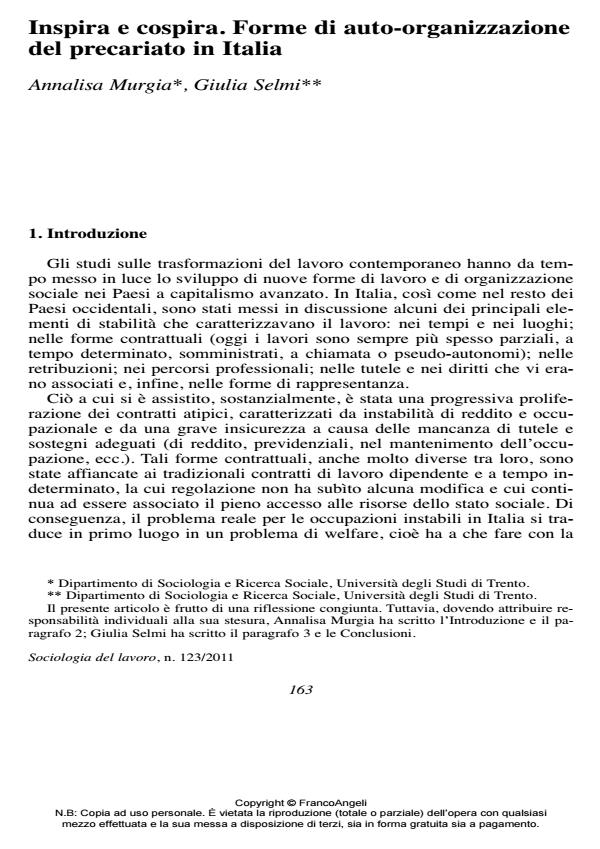Inspire and conspire. Forms of self-organization of precarious workers in Italy
Journal title SOCIOLOGIA DEL LAVORO
Author/s Annalisa Murgia, Giulia Selmi
Publishing Year 2011 Issue 2011/123
Language Italian Pages 14 P. 163-176 File size 102 KB
DOI 10.3280/SL2011-123010
DOI is like a bar code for intellectual property: to have more infomation
click here
Below, you can see the article first page
If you want to buy this article in PDF format, you can do it, following the instructions to buy download credits

FrancoAngeli is member of Publishers International Linking Association, Inc (PILA), a not-for-profit association which run the CrossRef service enabling links to and from online scholarly content.
The scenario we see today in the labor market in Italy is composed by a progressive proliferation of non-standard contracts. This involves first and foremost a problem of citizenship and welfare, due to the lower or nearly nonexistent possibility of access to social rights associated to these types of contracts (pension rights, paid leave for sickness, maternity, unemployment, ecc.). Faced with this situation of severe precariousness and lack of access to the resources of welfare, however, over the last ten years, Italy has seen the emergence and consolidation of a complex social movement to counter the precariousness, directly enacted by the generation most hardly hit by the deregulation of the labor market: youngsters, women, and "cognitarious" (precarious knowledge workers). This movement at first concentrated its efforts in the rewriting of the symbolic vocabulary and imagination at work, in an attempt to consolidate the precarious as collective subjectivity beyond its traditional representations. In recent years, however, this process of "self-representation" in terms of a collective narrative is matched by a process of "auto-representation": an effective auto-organization of temporary workers to handle the conflict in the workplace. In a scenario of no confidence in political parties and trade unions in addressing the issue of precariousness, in fact, these movements refuse the delegation of the conflict, promoting instead a modality of action based on the organizational form of the network, sharing knowledge and direct representation. The aim of this paper is to critically explore two experiences of self-organization of precarious workers in relation to the current crisis of representation through the traditional trade unions, especially with regard to young workers and non-standard employment relationships.
Keywords: Precariousness, social movements, trade unions, representation, conflict, auto-organization
- LGBTQ+ Intimacies in Southern Europe Beatrice Gusmano, pp.167 (ISBN:978-3-031-13507-1)
Annalisa Murgia, Giulia Selmi, Inspira e cospira. Forme di auto-organizzazione del precariato in Italia in "SOCIOLOGIA DEL LAVORO " 123/2011, pp 163-176, DOI: 10.3280/SL2011-123010